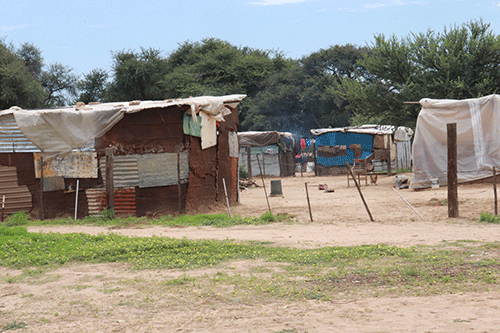Loide Jason
Rose-Mary Haufiku
Residents of an informal settlement in the Windhoek Rural constituency are pleading with the government to take full ownership of the area so they too can benefit from developmental projects.
Stinkwater, near Dordabis, 90km east of Windhoek, is home to more than 600 residents, mostly unemployed, who live in makeshift structures fashioned out of corrugated iron sheets and recycled materials.
The residents say their ancestors lived there before the private owners acquired the land and they also want to benefit from government’s projects.
The settlement has been on the news recently for all the wrong reasons.
Angelka Karises, one of the committee members, said the government once approached the residents to bring electricity to the area, however, the private owner refused, claiming, it will create the mushrooming of shebeens and violence.
“We do not have clinics, schools and other development projects in the area that will create jobs because there is no electricity. The private owners have refused some of these developments and people have now resorted to committing illicit activities, particularly the youths,” she said.
She said because of a lack of development in the area crimes are skyrocketing.
“People are beating each other after abusing alcohol. Children are in the streets and become drug dealers, the situation is bad here. That is why we want the government to get involved,” she said.
She related the incident of a woman who was brutally killed last year at the settlement. The body of 23-year-old Lydia Garises was found in a riverbed in the mountains last December. According to the police, Garises was sexually violated and her genitals allegedly removed.
“As you can see, last December, there was a killing of the late Lydia Garises. She was murdered and cut into pieces. It happened in the dark and we did not see it when it happened. So, that is why we need electricity much faster,” she said.
She is also concerned about the lack of schools in their area and said they feel left out of the benefits of independent Namibia.
“The schools are very few. So, we want the government to give us more projects,” she stated with the support of her fellow residents who were whispering reminding her about more challenges.
She said the children from the area travel more than 10 kilometres to attend school in Dordabis or Brooklyn.
“Those primary schools only cater for grade 1 to 7. If the children drop out of school, it will increase the unemployment rate because there are no jobs here in Stinkwater. We want the government to give us projects or develop schools, clinics (even mobile) and police stations. We need them,” she said.
“The farm is owned both by government and private owners, but we want the government to provide electricity on the side they own instead of the privately-owned properties to avoid conflict. We want to build a school and that school is going to need electricity. The clinic and houses are also going to need electricity. Our houses are burning because we use candles. We don’t know where the government property begins and ends, but we are where our great grandparents were located,” the residents added.
Meanwhile, the councillor of the Windhoek Rural constituency Piet Adams said Stinkwater has become a settlement in the hands of private owners, yet the government has to bring services for the greater masses who are living there.
He said Stinkwater was earmarked for electricity a long time ago but the private owners refused that is why it still does not have electricity.
Another issue, the councillor explained, is the lack of employment, among the youth.
“Windhoek Rural is one of the constituencies that are not benefiting from drought relief, unlike other constituencies in Windhoek that are getting the Harambee food,” he said.



